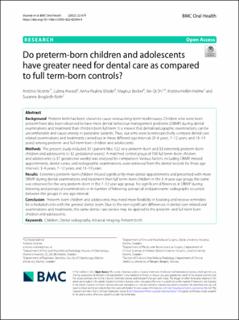| dc.contributor.author | Vicente, António | |
| dc.contributor.author | Alward, Lubna | |
| dc.contributor.author | Wiedel, Anna-Paulina | |
| dc.contributor.author | Becker, Magnus | |
| dc.contributor.author | Shi, Xie-Qi | |
| dc.contributor.author | Hellén-Halme, Kristina | |
| dc.contributor.author | Brogårdh-Roth, Susanne | |
| dc.date.accessioned | 2023-03-16T12:49:38Z | |
| dc.date.available | 2023-03-16T12:49:38Z | |
| dc.date.created | 2022-11-29T11:51:33Z | |
| dc.date.issued | 2022 | |
| dc.identifier.issn | 1472-6831 | |
| dc.identifier.uri | https://hdl.handle.net/11250/3058796 | |
| dc.description.abstract | Background
Preterm birth has been shown to cause various long-term health issues. Children who were born preterm have also been observed to have more dental behaviour management problems (DBMP) during dental examinations and treatment than children born full term. It is known that dental radiographic examinations can be uncomfortable and cause anxiety in paediatric patients. Thus, our aims were to retrospectively compare dental care related examinations and treatments carried out in three different age intervals (3–6 years, 7–12 years, and 13–19 years) among preterm- and full-term born children and adolescents.
Methods
The present study included 311 patient files: 122 very preterm–born and 33 extremely preterm–born children and adolescents (< 32 gestational weeks). A matched control group of 156 full term–born children and adolescents (≥ 37 gestational weeks) was analysed for comparison. Various factors, including DBMP, missed appointments, dental caries, and radiographic examinations, were retrieved from the dental records for three age intervals: 3–6 years, 7–12 years, and 13–19 years.
Results
Extremely preterm–born children missed significantly more dental appointments and presented with more DBMP during dental examinations and treatment than full term–born children in the 3–6-year age group; the same was observed for the very preterm–born in the 7–12-year age group. No significant differences in DBMP during bitewing and periapical examinations or in number of bitewing, periapical and panoramic radiographs occurred between the groups in any age interval.
Conclusion
Preterm–born children and adolescents may need more flexibility in booking and receive reminders for scheduled visits with the general dental team. Due to the non-significant differences in dental care related oral examinations and treatments, the same dental care service may be applied to the preterm- and full-term born children and adolescents. | en_US |
| dc.language.iso | eng | en_US |
| dc.publisher | BMC | en_US |
| dc.rights | Navngivelse 4.0 Internasjonal | * |
| dc.rights.uri | http://creativecommons.org/licenses/by/4.0/deed.no | * |
| dc.title | Do preterm-born children and adolescents have greater need for dental care as compared to full term-born controls? | en_US |
| dc.type | Journal article | en_US |
| dc.type | Peer reviewed | en_US |
| dc.description.version | publishedVersion | en_US |
| dc.rights.holder | Copyright 2022 The Author(s) | en_US |
| dc.source.articlenumber | 479 | en_US |
| cristin.ispublished | true | |
| cristin.fulltext | original | |
| cristin.qualitycode | 2 | |
| dc.identifier.doi | 10.1186/s12903-022-02504-8 | |
| dc.identifier.cristin | 2083839 | |
| dc.source.journal | BMC Oral Health | en_US |
| dc.identifier.citation | BMC Oral Health. 2022, 22, 479. | en_US |
| dc.source.volume | 22 | en_US |

